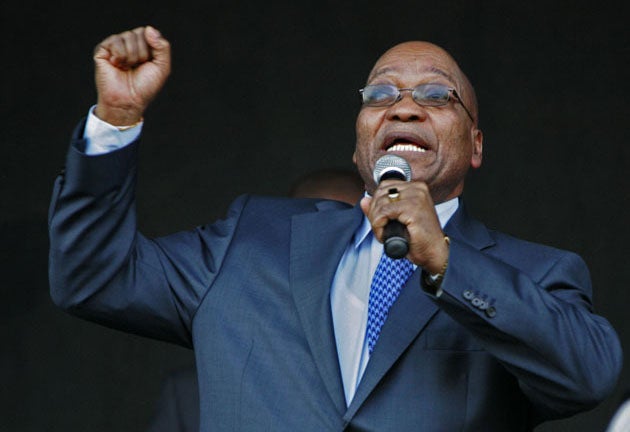Relief matched by dismay as Zuma cleared

Two weeks before South Africa's most important election since the end of apartheid, corruption charges have been dropped against Jacob Zuma, the president-in-waiting.
Today's decision to abandon the investigation which has dogged the ruling party's leader for much of the past eight years was met with relief by investors in Africa's largest economy but dismay among many in the judiciary.
How the decision will affect the forthcoming election is unclear because the African National Congress (ANC) leader has not cleared his name but has dodged a trial after prosecutors said fresh evidence had been presented to them showing the charges against Mr Zuma were "politically motivated".
The ruling party is expected to win the 22 April vote but faces its toughest contest since taking power in 1994. Its election campaign has been tainted by charges from opposition groups of intimidation by the ANC; the paroling of Mr Zuma's former business adviser; and the re-emergence of Nelson Mandela's disgraced former wife Winnie as a ministerial contender.
The National Prosecuting Authority (NPA), South Africa's equivalent of an attorney general's office, has been under intense pressure, with clear signals given that a wholesale clear-out of the organisation would be ordered under the incoming Zuma administration.
Mokotedi Mpshe, the acting head of the NPA, said dropping the charges had been the "hardest decision" of his life. He said taped conversations between senior officials showed the timing of the charges against the then Vice President was designed to hurt him politically.
At that point in 2007, the 66-year-old former guerrilla leader was engaged in a desperate power struggle with the then President Thabo Mbeki.
By claiming he was the victim of a witch-hunt, Mr Zuma succeeded in ousting his rival from the leadership of the party later that year. In September 2008, Mr Mbeki was forced to resign the presidency after a judge accused him of interfering in the Zuma corruption case.
Appeal judges this year reinstated the charges against Mr Zuma but yesterday's announcement showed there is no further appetite for pursuing the case. The charges related to a five billion rand (£373m) 1999 arms deal in which large kickbacks were paid by international arms companies to senior government officials in return for the purchase of overpriced and unsuitable armaments.
Mr Zuma is accused of accepting bribes from a French firm involved in the deal. He has denied the charges. His business partner, Schabir Shaik, was imprisoned on related charges but was recently released on health grounds.
"It's a dark day for South African law," said Mr Zuma's main presidential rival, Mvume Dandala, who is standing for the ANC breakaway COPE party. "The South African people want to know: Is he innocent or is he guilty?"
COPE's criticism of the handling of the case has been undermined because many of their leading candidates were implicated in the scandal. Despite anger among opposition groups and civil society, Mr Zuma remains popular among ordinary South Africans widely disenchanted with Mr Mbeki.
The ANC secretary general Gwede Mantashe told a press conference that Mr Zuma had "endured an ordeal that has never been experienced by any other citizen". He said that the NPA had "surrendered their professional independence by engaging in … political battles".
The April vote is all but certain to see the completion of Jacob Gedleyihlekisa Zuma's extraordinary journey from being an uneducated Zulu herder to the presidency of South Africa. His power base within the party is built not only on his populist campaigning style but also his time as intelligence chief in the ANC's military wing. His period as head of the Mbokodo – or "the stone that crushes" – means the left-winger has unparalleled information on his political rivals.
His access to high-level intelligence was demonstrated when his legal team presented wire-tapped conversations between the chief prosecutor and an investigator to prove their client was the victim of a conspiracy. His lawyers made no attempt to explain how they acquired the tapes, which would have been inadmissible in a court of law.
Join our commenting forum
Join thought-provoking conversations, follow other Independent readers and see their replies
Comments
Bookmark popover
Removed from bookmarks